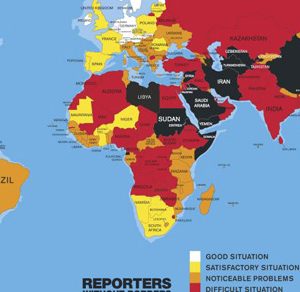Reporters Without Borders’ annual press freedom report shows that many journalists in Southeast Asia operate under threat from oppressive regimes
An annual assessment of press freedom in 180 countries released by campaign group Reporters Without Borders reveals a mixed bag of progress and decline in the region.
Of the 11 countries in Southeast Asia, four saw falls in their rankings in the 2016 report, with Laos sinking two places to 173 and Brunei plummeting 34 to 155 from the previous year.
But significant improvements were recorded in Indonesia, which jumped by eight places to 130, while Timor-Leste rose four spots to 99 and Cambodia moved up 11 to rank 128. Vietnam and Laos both languished near the bottom of the list, with the former at 175 and the latter at 173.
According to the Reporters Without Borders report, bloggers and citizen journalists in Vietnam are “the permanent targets of extremely harsh forms of persecution including police violence”. The country’s vague laws restricting internet use for “personal information” assists authorities in cracking down on individuals deemed a ‘threat’ by the state.
In Laos, which is headed by a Communist party as in Vietnam, the government exercises complete control over the media. A 2014 law outlaws any criticism of the government and the ruling party in the press.
Brunei’s dramatic fall in the rankings was blamed on the progressive introduction of sharia law added to already repressive media legislation that forced journalists to self-censor.
Cambodia’s improvement was welcomed by Information Ministry spokesman Ouk Kimseng, the Phnom Penh Post reported. However, he said that the organisation focused too intensely on negatives such as the dangers of reporting illegal activities. Overall “freedom of the press is being enjoyed … by most journalists here in Cambodia,” Kimseng said.
And despite Indonesia’s jump from 138 to 130 in the rankings year on year, the report noted that overall, press freedom was low throughout the country and non-existent in West Papua, while in Timor-Leste, a draconian media law was put before parliament in 2014, but withdrawn for amendment after protests.
“The 2016 World Press Freedom Index reflects the intensity of the attacks on journalistic freedom and independence by governments, ideologies and private-sector interests during the past year,” stated Reporters Without Borders.
Syria, Turkmenistan, North Korea and Eritrea are ranked as being the least free in terms of press freedom, while the European countries of Finland, Netherlands, Norway and Denmark hold the top four spots.
State of press freedom remains dire across much of region
Reporters Without Borders’ annual press freedom report shows that many journalists in Southeast Asia operate under threat from oppressive regimes


